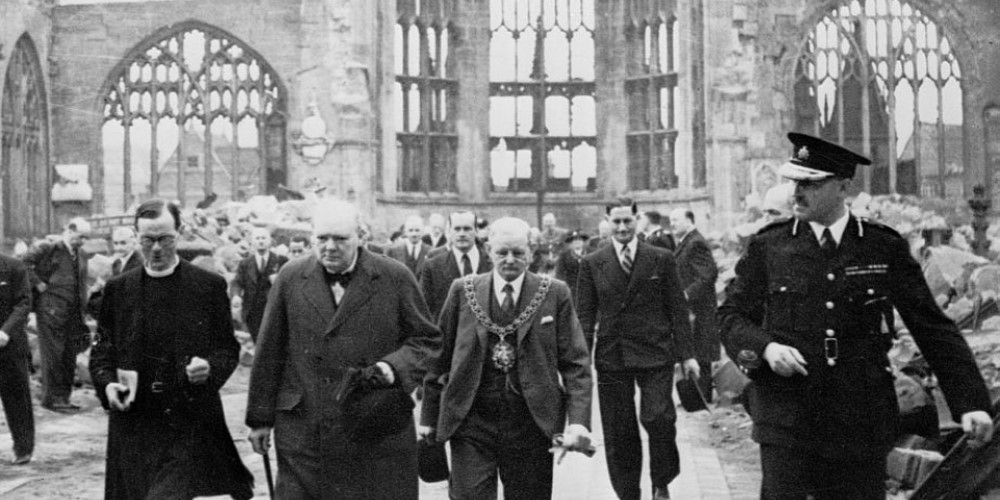American politicians and strategists regularly fail to plan for restoring order after the fighting stops - Nadia Schadlow explains why.
Churchill's Providential Confidence
Britain has had its share of politicians and statesmen who have been “vocal about their faith,” from the earnest, evangelical William Wilberforce (with his noble, indefatigable, and ultimately successful fight against slavery and the slave trade) to the tough-minded Methodist Margaret Thatcher, to the rather progressive Catholic convert Tony Blair. As the intellectual historian Gary Scott Smith shows in his welcome new book Duty and Destiny: The Life and Faith of Winston Churchill, Churchill is not among them.
The great statesman’s religious convictions remained to the end somewhat enigmatic, even elusive. Yet Smith’s succinct but exhaustive survey of the matter demonstrates that two positions can be safely ruled out: Churchill was neither an atheist (except for a brief if intense period of unbelief in his youth) nor an orthodox Christian who affirmed the Trinitarian God and the divinity of Jesus Christ. The distinguished historian and Churchill scholar John Lukacs, himself a Catholic of serious conviction, sees Churchill as above all a pagan in the noblest classical sense, even if his moral convictions were shaped in important respects by Christianity. There is some truth to this. But Churchill’s magnanimity, a quintessentially and initially pagan virtue, was always accompanied by a sense of mercy, chivalry, duty, fair play, and concern for the “humble masses” in their “cottage homes,” that took the hardest edges off of classical pride.
As Smith, Paul Johnson, and Paul Addison all emphasize, Churchill had genuine solicitude for the fate of the poor, the “small man,” “the underdog”—a solicitude that led him to promote salutary welfare measures as a minister in a liberal government during the Edwardian period at the beginning of the 20th century. He strongly opposed socialism but supported a modest but vigorous welfare state to “help the poor and the working class.” Churchill was magnanimous and chivalric in a way that owes much to the precious inheritance that is Christian ethics: his greatness of soul was marked by generosity, kindness, and a concern for the common good. Like the pagan Cicero and the Christian Edmund Burke, his soul impressively melded together magnanimity and moderation, heroic greatness with solicitude for political liberty and the survival and sustenance of civilized order. His capacious soul had ample room for the full range of the classical and the Christian virtues, and for a high-minded conception of democracy that did not reject the necessary “continuity” of civilization. He did not reject democracy; he aimed to ennoble it within the limits of the possible. Like Burke, he was a man of high and principled prudence.
Abandoning Atheism
Rather like Abraham Lincoln before him, Churchill often used “Fate,” “Destiny,” Providence, and God interchangeably in his speeches, writings, and correspondence. Even as a fevered young atheist in the Sudan in 1898 and in South Africa a year or two later fighting in the Boer War (he had abandoned his conventional, tepid Anglicanism after reading the likes of Edward Gibbon, William Lecky, and William Winwood Reade—all pronounced rationalists committed to exposing Christianity as a pernicious superstition), Churchill saw a “Higher Power” at work protecting him from injury and death. It was Providence that guided him in his improbable, heroic escape from Boer captivity. For a time, it can be said, Churchill believed in some benevolent “Destiny” or “Providence” looking after him, even if he did not necessarily identify that “Fate” with the God of the Bible or even the God of the philosophers. But even in his period of militant rationalism, which was comparatively short-lived, he did not want to “écrasez l’infâme” (“crush the infamy”—revealed religion—à la Voltaire). Commenting at this time on Gibbon’s desire to prove Christianity both false and pernicious, Churchill acknowledged “Toute vérité n’est pas bonne à dire” (“Not all truths should be spoken”). Churchill was never prone to fiery extremism or political irresponsibility.
Soon enough, Churchill discovered the limits of histrionic rationalism. He came to see that Christianity, and all the great religions, speak above all to the whole soul, to the whole human person. Smith quotes a Pascal-inspired remark of Churchill from My Early Life (1930): “It seemed . . . very foolish to discard the reasons of the heart for those of the head.” Such a balanced reassessment, Smith shows, prompted Churchill to repudiate his juvenile atheism: “’The Supreme Creator, who gave us our minds as well as our souls,’ he concluded, would not ‘be offended if they did not always run smoothly together in double harness. After all He must have foreseen this from the beginning and of course HE would understand it all.‘“ Writing to his wife Clementine in 1928, long after he had outgrown his youthful skepticism, Churchill lamented that his son Randolph was for the moment attached to a rabid and obnoxious agnosticism and thus risked making a “nuisance” of himself.
In his splendid essay on Moses in Thoughts and Adventures (1932), Churchill showed his annoyance at “purely rationalistic and scientific explanations” of the Bible that miss its deeper spiritual truths. Churchill did not doubt the greatest miracle of all: “This wandering tribe, in many respects indistinguishable from numberless nomadic communities, grasped and proclaimed the idea of which all the genius of Greece and all the power of Rome were incapable. There was to be only one God, a universal God, a God of nations, a just God, a God who would punish in another world a wicked man dying rich and prosperous, a God from whose service the good of the humble and weak and the poor was inseparable.” This is a truth and insight that Churchill seemed to affirm and for which he had the greatest respect and appreciation. He had come a long way, indeed, from facile rationalism and atheism.
Defender of Christian Civilization
It is in his immense struggle with what he called “the non-god religions” of Communism and Nazism that Churchill’s defense of Christian ethics, and Christian civilization, became most pronounced. Both of these totalist ideologies “substituted the devil for God and hatred for love” as Churchill strikingly put it in a speech in 1936. They “spurned Christian ethics” and viciously persecuted Christians (especially Bolshevism) and Jews (especially Nazism). In his great speech of October 5, 1938 assailing the Munich Pact, Churchill denounced Nazism for its “barbarous paganism” (we are a long way from the noble paganism of the classics) that “exalted ‘the spirit of aggression and conquest’ and that derived ‘strength and perverted pleasure from persecution.’”
Churchill was a magnanimous man, but not the haughty and self-sufficient “magnanimous man” of Aristotle, whose virtue and pride hardly coexist with generous fellow feeling.
In his greatest wartime address, the “Finest Hour” speech of June 18, 1940, Churchill linked success in the Battle of Britain (this as France was falling to Nazi captivity) to “the survival of Christian civilization.” Not democracy or liberalism per se, but the Christian civilization that saw in each precious soul “the image of God” and that called on us to treat other human persons with a modicum of respect, charity, and decency. This was the civilization that called forth noble displays of mercy, forgiveness, and reconciliation. Not even classical paganism at its best—say, Aristotle, Cicero, and the Stoics—could claim that. In Nazism and Communism, Churchill saw a satanic repudiation of human liberty and human dignity, a repudiation at one and the same time of Christian ethics and modern liberty. The two, in Churchill’s estimation, stood or fell together.
Scott cites the notable intellectual historian of English religion and politics Maurice Cowling as saying that the youthful Churchill was “uncertain whether transcendental right existed.” Not so the mature Churchill. Even in The River War (1899), according to Smith, Churchill had “affirmed his belief in transcendent truth and absolute moral standards that were not relative to particular times and places.” Human beings in all times and climes desired, in Churchill’s words, “to associate their actions with at least with the appearance of moral right. However distorted may be their conception of virtue, however feeble their efforts to attain even to their own ideals, it is a pleasing feature and hopeful augury that they should wish to be justified. . . . It is an involuntary tribute, the humble tribute of imperfect beings, to the eternal Temples of Truth and Beauty.” Is there a more eloquent account of the stirrings of moral right and natural conscience in the human heart or soul, or of the experiences that give rise to an affirmation of natural justice and transcendental truth and beauty?
Let us return to Churchill’s moral bearing, a bearing that is at once classical and Christian in the substantial place it finds for honor, courage, duty, and good will. The same man who stirred men’s souls with his noble call to “Never Surrender!” to a barbarous and totalitarian Nazi Germany once said that if Jesus came back to earth again, he suspected that he might first go “to the untouchables of India“ in order “to give them the tidings that not only are all men equal in the sight of God, but that for the weak and poor and downtrodden a double blessing is reserved.” Churchill was a magnanimous man, but not the haughty and self-sufficient “magnanimous man” of Aristotle, whose virtue and pride hardly coexist with generous fellow feeling.
Gary Scott Smith should be commended for making available all the crucial evidence regarding Churchill, religion, and the life of the soul. I think he is right that the great Churchill was, in the end, neither an atheist nor an orthodox Christian. He is right that the divinity of Christ plays no major role in Churchill’s thought or his sundry reflections on religion. Perhaps Smith is even right that in some technical sense Churchill was a Unitarian, although hardly of the morally undemanding and self-parodically politically progressive kind that we see around us. But in the end, Churchill’s soul is perhaps more interesting, more revealing, than his formal and somewhat elusive religious convictions. That soul and its admirable mix of magnanimity and moderation, to repeat, is unthinkable without the Christianity that Churchill could never bring himself to reject.



